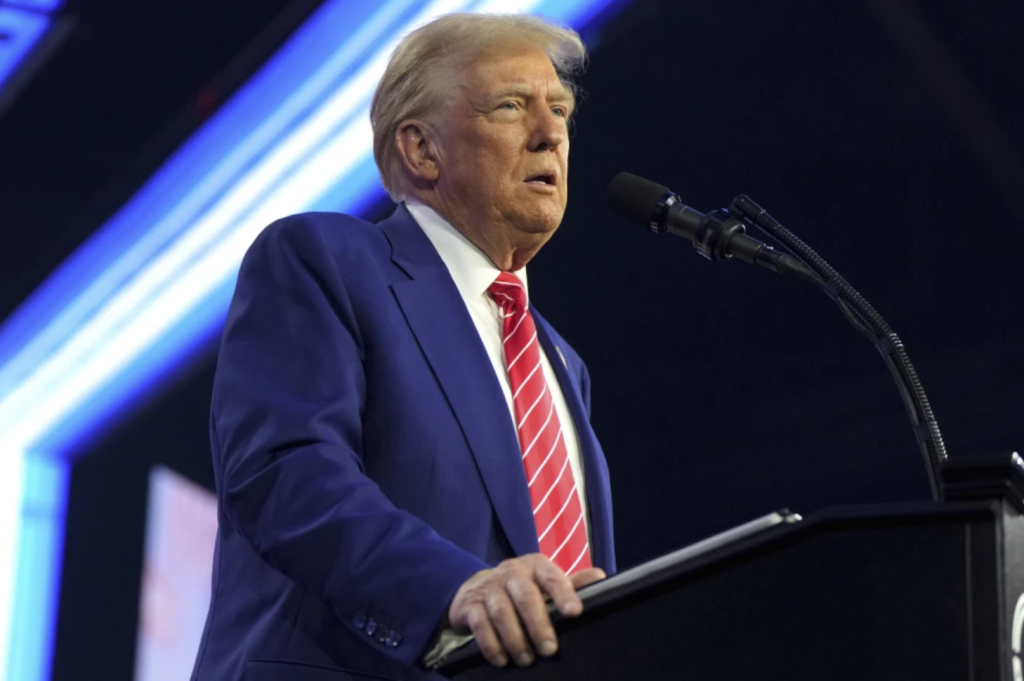President-elect Donald Trump promised on Tuesday to “vigorously pursue” capital punishment after President Joe Biden commuted the sentences of most people on federal death row partly to stop Trump from pushing forward their executions.

Trump criticized Biden’s decision on Monday to change the sentences of 37 of the 40 condemned people to life in prison without parole, arguing that it was senseless and insulted the families of their victims. Biden said converting their punishments to life imprisonment was consistent with the moratorium imposed on federal executions in cases other than terrorism and hate-motivated mass murder.
“Joe Biden just commuted the Death Sentence on 37 of the worst killers in our Country,” he wrote on his social media site. “When you hear the acts of each, you won’t believe that he did this. Makes no sense. Relatives and friends are further devastated. They can’t believe this is happening!”
Presidents historically have no involvement in dictating or recommending the punishments that federal prosecutors seek for defendants in criminal cases, though Trump has long sought more direct control over the Justice Department’s operations. The president-elect wrote that he would direct the department to pursue the death penalty “as soon as I am inaugurated,” but was vague on what specific actions he may take and said they would be in cases of “violent rapists, murderers, and monsters.”
He highlighted the cases of two men who were on federal death row for slaying a woman and a girl, had admitted to killing more and had their sentences commuted by Biden.
Is it a plan in motion or more rhetoric?
On the campaign trail, Trump often called for expanding the federal death penalty — including for those who kill police officers, those convicted of drug and human trafficking, and migrants who kill U.S. citizens.
“Trump has been fairly consistent in wanting to sort of say that he thinks the death penalty is an important tool and he wants to use it,” said Douglas Berman, an expert on sentencing at Ohio State University’s law school. “But whether practically any of that can happen, either under existing law or other laws, is a heavy lift.”
Berman said Trump’s statement at this point seems to be just a response to Biden’s commutation.
“I’m inclined to think it’s still in sort of more the rhetoric phase. Just, ‘don’t worry. The new sheriff is coming. I like the death penalty,’” he said.
Most Americans have historically supported the death penalty for people convicted of murder, according to decades of annual polling by Gallup, but support has declined over the past few decades. About half of Americans were in favor in an October poll, while roughly 7 in 10 Americans backed capital punishment for murderers in 2007.
Death row inmates are mostly sentenced by states
Before Biden’s commutation, there were 40 federal death row inmates compared with more than 2,000 who have been sentenced to death by states.
“The reality is all of these crimes are typically handled by the states,” Berman said.
A question is whether the Trump administration would try to take over some state murder cases, such as those related to drug trafficking or smuggling. He could also attempt to take cases from states that have abolished the death penalty.
Could rape now be punishable by death?
Berman said Trump’s statement, along with some recent actions by states, may present an effort to get the Supreme Court to reconsider a precedent that considers the death penalty disproportionate punishment for rape.
“That would literally take decades to unfold. It’s not something that is going to happen overnight,” Berman said.
Before one of Trump’s rallies on Aug. 20, his prepared remarks released to the media said he would announce he would ask for the death penalty for child rapists and child traffickers. But Trump never delivered the line.
What were the cases highlighted by Trump?
One of the men Trump highlighted on Tuesday was ex-Marine Jorge Avila Torrez, who was sentenced to death for killing a sailor in Virginia and later pleaded guilty to the fatal stabbing of an 8-year-old and a 9-year-old girl in a suburban Chicago park several years before.
The other man, Thomas Steven Sanders, was sentenced to death for the kidnapping and slaying of a 12-year-old girl in Louisiana, days after shooting the girl’s mother in a wildlife park in Arizona. Court records show he admitted to both killings.
Some families of victims expressed anger with Biden’s decision, but the president had faced pressure from advocacy groups urging him to make it more difficult for Trump to increase the use of capital punishment for federal inmates. The ACLU and the U.S. Conference of Catholic Bishops were some of the groups that applauded the decision.
Biden left three federal inmates to face execution. They are Dylann Roof, who carried out the 2015 racist slayings of nine Black members of Mother Emanuel AME Church in Charleston, South Carolina; 2013 Boston Marathon bomber Dzhokhar Tsarnaev; and Robert Bowers, who fatally shot 11 congregants at Pittsburgh’s Tree of Life Synagogue in 2018, the deadliest antisemitic attack in U.S history. _